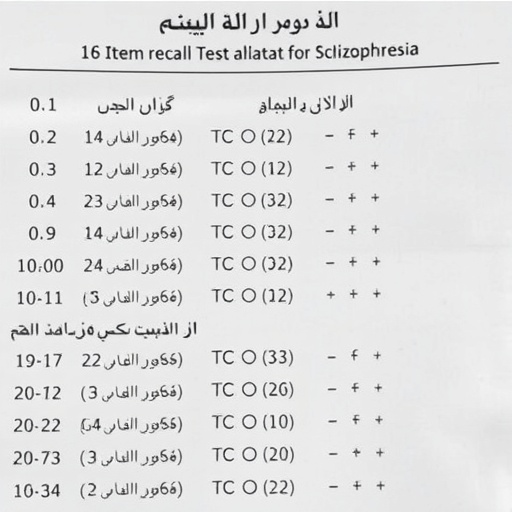In the realm of psychiatric research, the accurate assessment of cognitive functions among individuals diagnosed with schizophrenia remains a critical challenge. A recent study published in BMC Psychiatry, volume 25, breaks new ground by validating the Arabic version of the 16-item Free and Cued Recall test, specifically tailored to evaluate verbal memory deficits within this population. This investigation, conducted at the Psychiatric Hospital of the Cross in Lebanon, promises to bridge cultural and linguistic gaps in cognitive assessment tools — an essential step for improving diagnostic precision and therapeutic outcomes in Arabic-speaking patients with schizophrenia.
Verbal memory impairment is a common feature of schizophrenia, often affecting patients’ quality of life and their ability to function in daily activities. While several subjective scales have been utilized worldwide, the necessity for culturally adapted and psychometrically validated tools cannot be overstated. The 16-item Free and Cued Recall test, known for its utility in memory evaluation, was translated and adapted to the Arabic language and context. The study’s primary ambition was to validate this adaptation among a robust sample size comprising 172 patients diagnosed with schizophrenia and 60 healthy control subjects.
Methodologically, this study employed a cross-sectional design to rigorously assess the psychometric properties of the Arabic version of the Free and Cued Recall test. This involved comprehensive administration and analysis of test-retest reliability, internal consistency, and factorial validity. The test itself challenges participants with the task of recalling a list of words freely, followed by recall based on specific cues, a nuanced approach believed to mirror real-world memory functioning better than free recall alone.
One of the critical findings is the internal consistency metric, which reached a respectable Cronbach’s alpha of 0.722. This statistic underscores the test’s reliability in measuring verbal memory within this demographic. Furthermore, factor analysis revealed a compelling two-factor solution explaining approximately 79.35% of the variance observed in the test scores — a significant indicator of the construct validity of this Arabic adaptation.
Comparatively, the study highlighted notable differences between schizophrenia patients and healthy controls across almost all recall components of the test, affirming the test’s sensitivity to memory impairments associated with schizophrenia. Interestingly, the only exceptions were found in cued recall 3 and delayed cued recall, where performance differences were not statistically significant. These nuances suggest potential areas for future research exploring the cognitive underpinnings and variability of memory processes in schizophrenia.
Beyond simply differentiating patient and control groups, the Arabic Free and Cued Recall test demonstrated meaningful correlations with established cognitive assessments. Positive relationships were evident with the Brief Assessment of Cognition in Schizophrenia (BACS) verbal memory scores and working memory domains — correlations of r = 0.352 and r = 0.421, respectively. This finding corroborates the test’s concurrent validity and positions it as a robust tool complementing other cognitive batteries.
Moreover, correlations with the Montreal Cognitive Assessment (MOCA), an established global cognitive screening tool, were moderate to strong (r = 0.474). This link further validates the test’s clinical applicability in cognitive screening among schizophrenia patients, suggesting it can serve as a reliable proxy for broader cognitive functioning assessments in Arabic-speaking settings.
Test-retest reliability, an often underscored psychometric attribute, was evaluated in this study with results supporting moderate temporal stability. The Pearson correlation coefficients ranged from 0.33 to 0.79, while intraclass correlation coefficients (ICCs) spanned 0.46 to 0.59. These metrics suggest that while the test produces consistent results over time, some variability may be intrinsic to the clinical condition or test administration.
The implications of validating the Arabic version of the 16-item Free and Cued Recall test extend beyond academic interest. Clinicians, neuropsychologists, and researchers now have an empirically supported instrument that can be confidently deployed in Arabic-speaking regions to assess verbal memory deficits in schizophrenia. Enhanced assessment precision can foster better individualized treatment planning and monitoring of cognitive interventions.
Additionally, this cultural adaptation addresses a critical gap in global mental health research. Language and cultural context profoundly influence neuropsychological test performance; thus, localized instruments provide more accurate and meaningful clinical information. This validation effort serves as a model for future cross-cultural adaptations of cognitive assessments in psychiatry.
The research team’s rigorous statistical analyses and comprehensive methodology provide strong evidence supporting the Arabic Free and Cued Recall test as a psychometrically sound tool. This foundation paves the way for its integration into routine clinical practice and future longitudinal research to track cognitive changes over the course of schizophrenia.
In summary, this landmark study demonstrates that the Arabic version of the 16-item Free and Cued Recall test possesses solid psychometric properties including adequate internal consistency, valid construct dimensions, and strong concurrent validity with established cognitive measures. These findings mark a substantial advance in the neuropsychological evaluation of Arabic-speaking patients with schizophrenia and underscore the broader importance of culturally sensitive assessment instruments in mental health.
As mental health professionals worldwide strive to improve diagnostic accuracy and patient outcomes through tailored tools, this validation study embodies the intersection of robust scientific inquiry and cross-cultural competency. It sets a precedent for continued development of linguistically and culturally relevant neuropsychological assessments that resonate with diverse patient populations across the globe.
Subject of Research: Validation of a verbal memory test (Free and Cued Recall test) adapted to Arabic for patients with schizophrenia.
Article Title: Validation of the Arabic version of the 16-item free and cued recall test among patients with schizophrenia
Article References:
Sam, N., Haddad, C., Calvet, B. et al. Validation of the Arabic version of the 16-item free and cued recall test among patients with schizophrenia. BMC Psychiatry 25, 1006 (2025). https://doi.org/10.1186/s12888-025-07417-8
Image Credits: AI Generated




